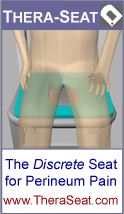

 |
Welcome to the Prostatitis Website!
|
 |

| We're sorry you are having to learn about prostatitis, but we're glad you came here, because we think we can help. To Members of Medical-Scientific Community, The NIH announced the allocation of $200 million to support hundreds of 2-year, $1 million challenge grants: The earliest date an application may be submitted to grants.gov is March 27, 2009. Applications are due on April 27, 2009. Peer review will take place over the summer and grants will be announced in the fall. Eligible US organizations/institutions are listed in the request for applications. We encourage you to contact the program officer(s) listed under each topic area for additional information and to discuss potential projects. Subscribe to the Prostatitis Foundation's NewsletterThere's a lot to learn. You and I have a lot to learn, and medical science has a lot to learn about prostatitis. Many cases of chronic prostatitis are not easy to cure. When you have read everything about prostatitis on this site, you may still have questions. The current state of scientific and medical knowledge about prostatitis is not very good, as any honest doctor will admit. We provide several ways for you to discuss prostatitis with others. This site is here to provide you with as much as possible of what is known. It is produced by volunteers and funded by your donations. Please, to make the best possible use of this site, follow as many of the links as you are able. There are more than 250 web pages on this site, so they cannot all be linked from this home page. It will take you a while to read them all, but it will be worth your while. (See list) When you are done, you can form your own opinion about what you should do. We're not going to tell you what to think.
|
||||||||
|
|
|||||||
|
|
|
||||||
|
 |
|||||||
|
......................................................................................... © The
Prostatitis Foundation |
||||||||
Dr Shoskes new Six
Day Clinic in the Stanford Protocol Short Videos of (2) PART B (3) David Wise, Ph.D.
Coauthor of A Headache in the Pelvis discussing European Association of Urology Meeting Istanbul
Information From Various Sources News Release: Allen Foundation grant awarded to UW at Seattle to study chronic pelvic pain in men.
*4 NEW* Broccoli sprouts may work better than broccoli -- enhanced sprouts available Science
can predict whether antibiotics will help— When will your
doctor be able to? Cipro, a commonly-prescribed antibiotic, may cause Chlamydia to persist in cells. It works for me Stories from the front lines About The Prostatitis Foundation Prostatitis Newsletters 2006: Cipro & Tamsuolosin trial by NH
|



 www.Fertilitysolution.com
www.Fertilitysolution.com
 www.healpelvicpain.com
www.healpelvicpain.com